Mises, Ludwig von. Human Action: A Treatise on Economics
Подождите немного. Документ загружается.

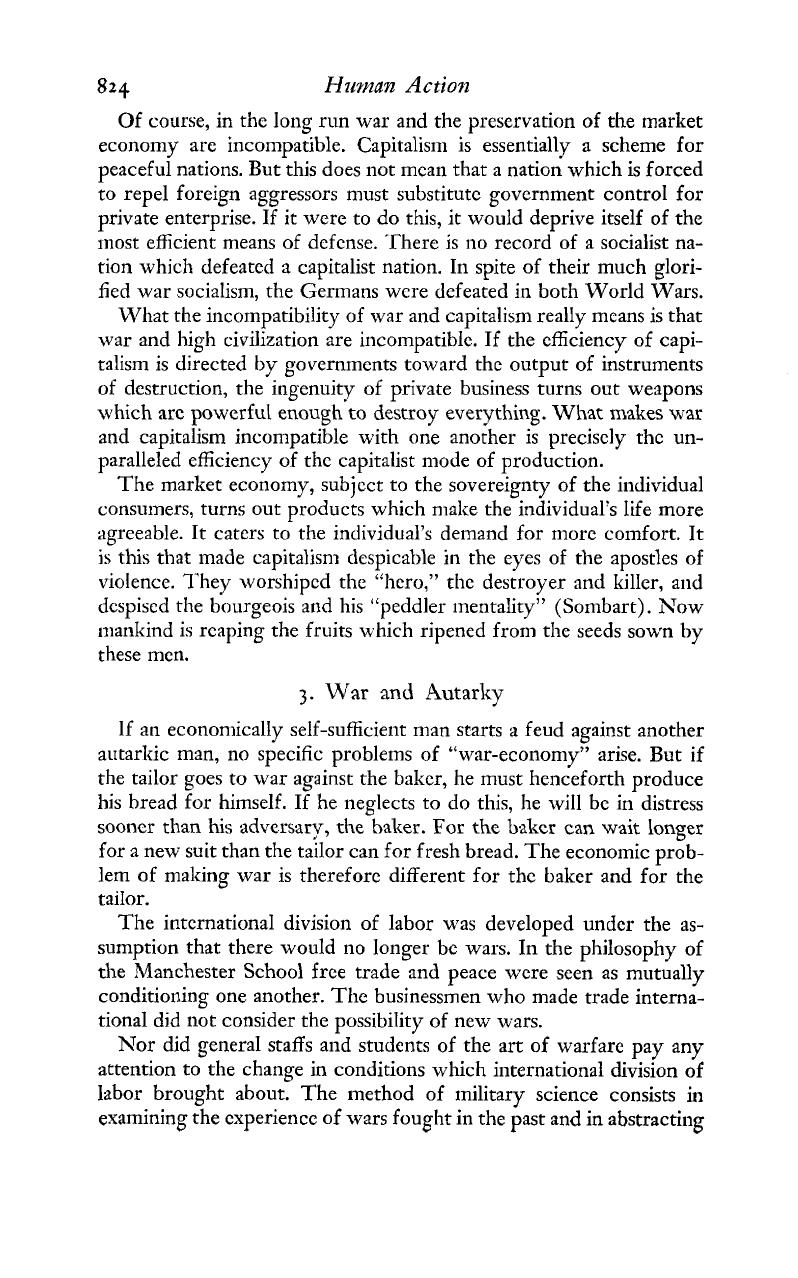
824
Human
Action
Of course, in the long run war and the preservation of the market
economy are incompatible. Capitalism is essentially
a
scheme for
peaceful nations. But this does not mean that a nation which is forced
to repel foreign aggressors must substitute government control for
private enterprise. If it were to do this, it would deprive itself of the
no st
efficient means of defense. There is no record of a socialist na-
tion which defeated a capitalist nation. In spite of their much glori-
fied war socialism, the Germans wcre dcfeated in both World Wars.
What the incompatibility of war and capitalism really means is that
war and high civilization are incompatible. If the efficiency of capi-
talism is directed by governments toward the output of instruments
of destruction, the ingenuity of private business turns out weapons
which arc powerful enough'to destroy everything. What makes war
and capitalism incompatible with one another is precisely the un-
paralleled efficiency of thc capitalist mode of production.
The market economy, subject to the sovereignty of the individual
consumers, turns out products which make the individual's Iife more
agreeable. It caters to the individual's demand for rnorc comfort. It
is this that made capitalism despicable in the eyes of the apostles of
violence. They worshipcd the "hero," the destroyer and killer, and
despised the bourgeois and his "peddler mentality" (Sombart). Now
mankind is reaping the fruits which ripened from the seeds sown
by
these men.
3.
War
and
Autarky
If an econon~ically self-sufficient man starts
a
feud against another
autarkic man, no specific problems of "war-economy" arise. But if
the tailor goes to war against the baker, he must henceforth produce
his bread for himself. If he neglects to do this, he will be in distress
sooner than his adversary, the baker. For the baker can wait longer
for a new suit than the tailor can for fresh bread. The economic prob-
lem of making war is therefore different for thc baker and for the
tailor.
The international division of labor was developed under the as-
sumption that there would no longer bc wars. In the philosophy of
the Manchester School free trade and peace wcre seen as mutually
conditiolling one another. The businessmen who made trade interna-
tional did not consider the possibility of new wars.
Nor did general staffs and students of the art of warfare pay any
attention to the change in conditions which international division of
labor brought about. The method of military science consists in
examining the experience of wars fought in the past and in abstracting
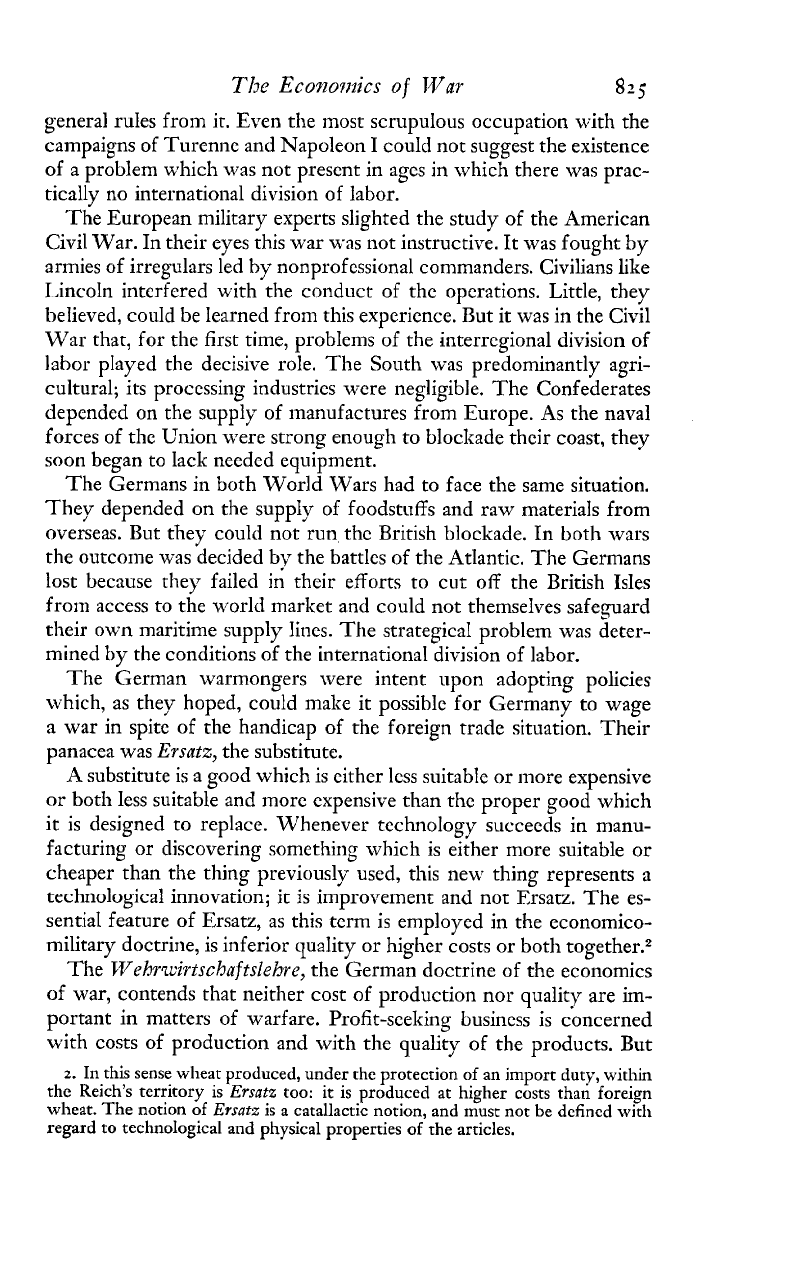
The
Economics of
War
82
j
general ruIes from it. Even the most scrupulous occupation with the
campaigns of Turenne and Napoleon
I
could not suggest the existence
of a problem which was not present in ages in which there was prac-
tically no international division of labor.
The European military experts slighted the study of the American
Civil War. In their eyes this war was not instructive. It was fought by
armies of irregulars led by nonprofessional commanders. Civilians like
Ihcoln interfered with the conduct of the operations. Little, they
believed, could be learned from this experience. But it was in the Civil
War that, for the first time, prohlems of the interregional division of
labor played the decisive role. The South was predominantly agri-
cultural; its processing industries were negligible. The Confederates
depended on the supply of manufactures from Europe. As the naval
forces of the Union were strong enough to blockade their coast, they
soon began to lack needed equipment.
The Germans in both World Wars had to face the same situation.
They depended on the supply of foodstuffs and raw materials from
overseas. But they could not run the British blockade. In both wars
the outcome was decided by the battles of the Atlantic. The Germans
lost because they failed
ii
their efforts to cut off the British Isles
from access to the u.orld market and could not themselves safe-guard
their own maritime supply lines. The strategicaI problem was deter-
mined by the conditions of the international division of labor.
The German warmongers were intent upon adopting policies
which, as they hoped, could make it possible for Germany to wage
a war in spite of the handicap of the foreign trade situation. Their
panacea was
Ersatz,
the substitute.
A substitute is a good which is either less suitabIe or more expensive
or both less suitable and more expensive than the proper good which
it is designed to replace. Whenever technology succeeds
in
manu-
facturing or discovering something which is either more suitable or
cheaper than the thing previously used, this new thing represents a
-.
techriologicai innovation;
ic
is improvement and not Ersatz.
I
ne es-
sentiaI feature of Ersatz, as this term is employed in the economico-
military doctrine, is inferior quality or higher costs or both t~gether.~
The
Wehr~~.irtschuftslehre,
the German doctrine of the economics
of war, contends that neither cost of production nor quality are im-
portant in matters of warfare. Profit-seeking business is c'oncerned
with costs of production and with the quality of the products. But
2.
In this sense wheat produced, under the protection of an import duty, within
the Reich's territory is
Ersatz
too: it is produced at higher costs than foreign
wheat. The notion of
Ersatz
is a catallactic notion, and must not be defined with
regard to technological and physical properties of the articles.
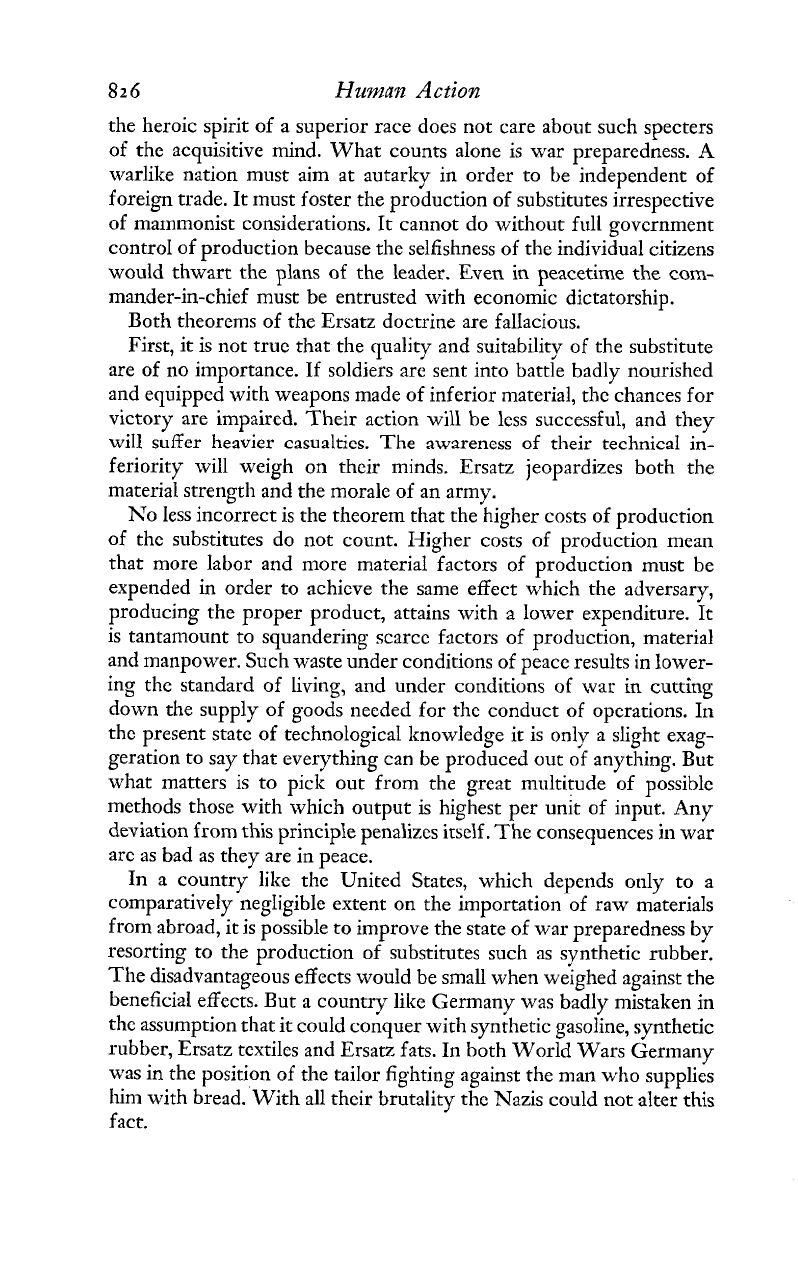
826
Hzmnn
Action
the heroic spirit of a superior race does not care about such specters
of the acquisitive mind. What counts alone
is
war preparedness.
A
warlike nation must aim at autarky in order to be independent of
foreign trade. It must foster the production of substitutes irrespective
of marnmonist considerations. It cannot do without full government
controI of production because the selfishness of the individual citizens
would thwart the plans of the leader. Even in peacetime the
com-
mander-in-chief must be entrusted with economic dictatorship.
Both theorems of the Ersatz doctrine are falIacious.
First, it is not true that the quality and suitability of the substitute
are of no importance. If soldiers are sent into battle badly nourished
and equipped with weapons made of inferior material, the chances for
victory are impaired. Their action will be less successful, and they
will suffer heavier casualties. The awareness of their technical in-
feriority will weigh on their minds. Ersatz jeopardizes both the
material strength and the rnorale of an army.
ATo less incorrect is the theorem that the higher costs of production
of the substitutes do not count. Higher costs of production mean
that more labor and more material factors of production must be
expended in order to achieve the same effect which the adversary,
producing the proper product, attains with a lower expenditure.
It
is tantamount to squandering scarcc factors of production, material
and manpower, Such waste under conditions of peace results in lower-
ing the standard of
living,
and under conditions of war in cutting
down the supply of goods needed for the conduct of operations.
In
the present state of technological ltnowledge
it
is
only
a slight exag-
geration to say that everything can be produced out of anything. But
what matters is to pick out from the great multitude of possible
methods those with which output is highest per unit of input. Any
deviation from this principle penalizes itself. The consequences
in
war
are as bad as they are in peace.
In
a
country like the United States, which depends only to a
comparatively negligible extent on the importation of raw materials
from abroad, it is possible to improve the state of war preparedness by
resorting to the production of substitutes such as synthetic rubber.
The disadvantageous effects would be small when weighed against the
beneficial effects. But a country like Germany was badly mistaken in
the assumption that it could corkper with synthetic gasoline, synthetic
rubber, Ersatz textiles and Ersatz fats. In both World Wars Germany
was in the position of the tailor fighting against the man
who
supplies
him with bread. With all their brutality the Nazis could not alter this
fact.
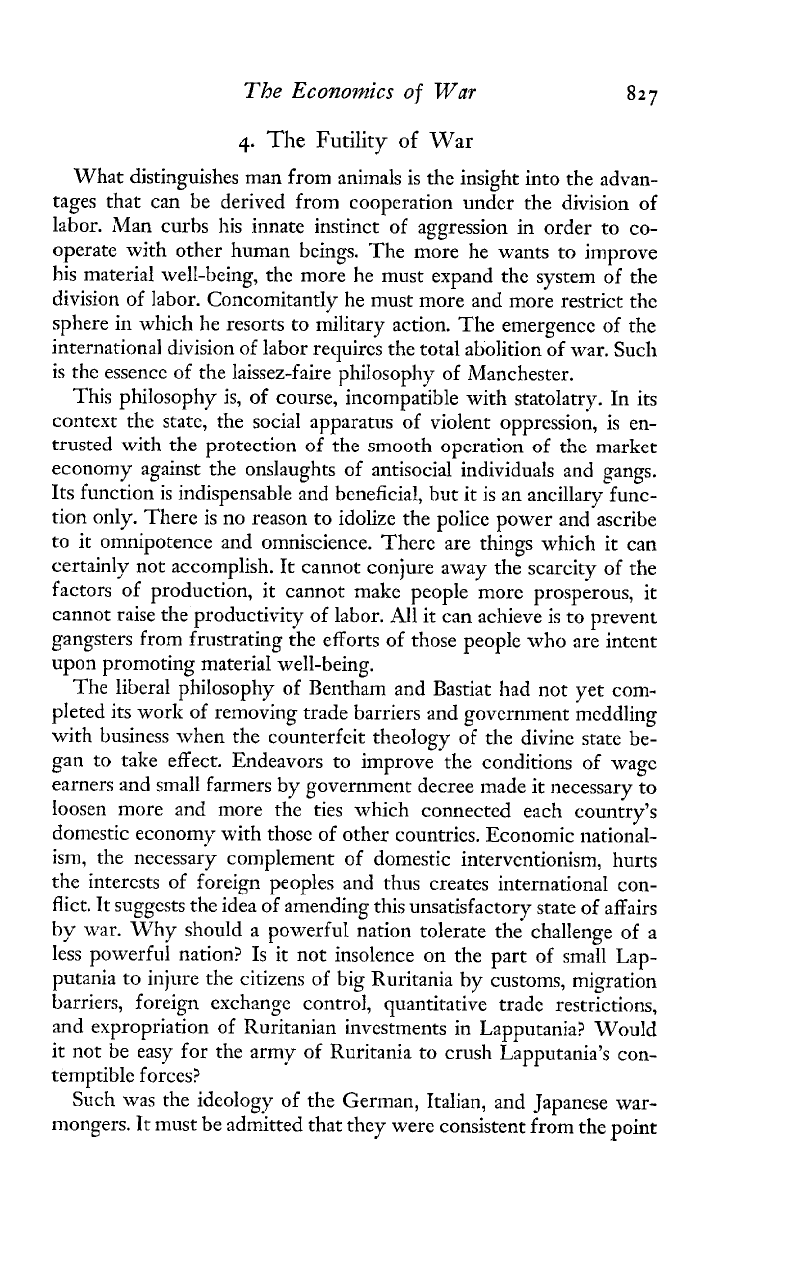
The
Economics
of
War
827
4.
The
Futility of War
What distinguishes man from animals is the insight into the advan-
tages that can be derived from cooperation undcr the division of
labor. Man curbs his innate instinct of aggression in order to co-
operate with other human bcings. 'The more he wants to improve
his material well-being, the more he must expand the system of the
division of labor. Concomitantly he must more and more restrict the
sphere in which he resorts to military action. The emergence of the
international division of labor requires the total abolition of
war.
Such
is the essencc of the laissez-faire phiIosophy of Manchestcr.
This philosophy is, of course, incompatible with statolatry. In its
context the statc, the social apparatus of violent oppression, is en-
trusted with
the
protection
of
the smooth operation of the market
economy against the onslaughts of antisocial individuals and gangs.
Its function is indispensable and beneficial, but it is
an
ancillary func-
tion only. There is no reason to idolize the police power and ascribe
to it omnipotence and omniscicnce. There are things which it can
certainly not accomplish.
It
cannot conjure away the scarcity of the
factors of production, it cannot make people more prosp~rous, it
cannot raise the productivity of labor. All it can achieve is to prevent
gangsters from frustrating the efforts of those people who arc intent
upon promoting materia1 well-being.
The liberal philosophy of Bentham and Bastiat had not yet com-
pleted its work of removing trade barriers and government mcddling
with business when the counterfeit theology of the divine state be-
gan to take effect. Endeavors to improve the conditions of wage
earners and small farmers by government decree made it necessary to
loosen more and more the ties which connected each country's
domestic economy with thosc of other countries. Economic national-
ism, the necessary complement of domestic interventionism, hurts
the interests of foreign peoples and thus creates international con-
flict. It suggests the idea of amending this unsatisfactory state of affairs
by war. U7hy should a powerfu1 nation tolerate the challenge of a
less powerful nation? Is
it
not insolence on the part of small Lap-
putania to injure the citizens of big Ruritania
by
customs, migration
barriers, foreign exchange control, quantitative trade restrictions,
and expropriation of Ruritanian investments in Lapputania? Would
it not be easy for the army of Ruritania to crush Lapputania's con-
temptible forces?
Such was the ideology of the German, Italian, and Japanese war-
mongers. It must be adm'itted that they were consistent from the point
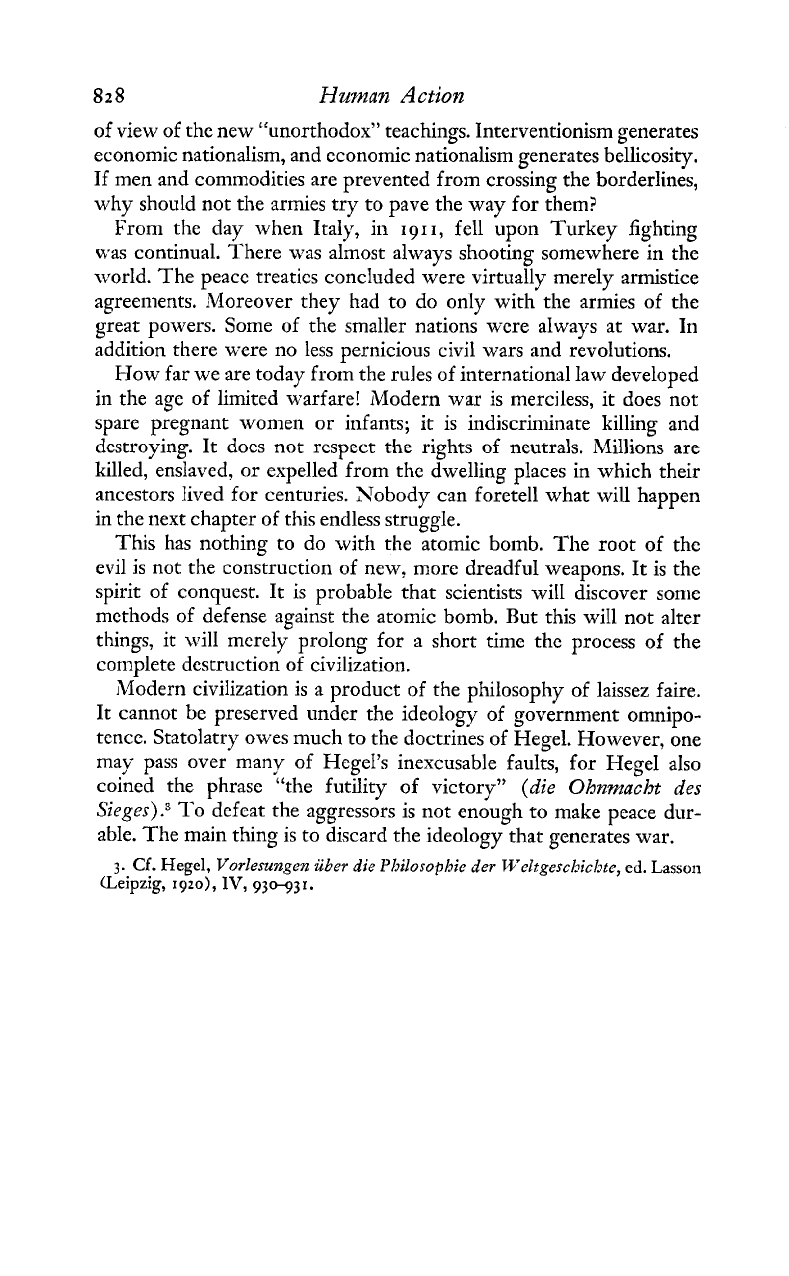
828
Human
Action
of view of the new "unorthodox" teachings. Interventionism generates
economic nationalism, and economic nationalism generates bellicosity.
If men and commodities are prevented from crossing the borderlines,
why should not the armies try to pave the way for them?
From the day when Italy, in
I
9
I
I,
fell upon Turkey fighting
was continual. There was airnost always shooting somewhere in the
world. The peace treaties concluded were virtually merely armistice
agreements. Moreover they had to do only with the armies
of
the
great powers. Some of the smaller nations were always at war.
In
addition there were no less pernicious civil wars and revolutions.
How far we are today from the rules of international law developed
in the age of limited warfare! Modern war is merciless, it does not
spare pregnant women or infants; it is indiscriminate killing and
destroying.
It
does not rcspect the rights of
neutrals.
Millions are
killed, enslaved, or expelled from the dwelling places in which their
ancestors lived for centuries. Nobody can foretell what will happen
in the next chapter of this endless struggle.
This has nothing to do with the atomic bomb. The root of the
evil is not the construction of new, more dreadful weapons. It is the
spirit of conquest. It is probable that scientists will discover sonle
methods of defense against the atomic bomb. Rut this will not alter
things, it will merely prolong for a short time the process of the
con~plete destruction of civilization.
Modern civilization is a product of the philosophy of laissez faire.
It cannot be preserved under the ideology of government omnipo-
tence. Statolatry owes much to the doctrines of Hegel. However, one
may pass over many of Hegel's inexcusable faults, for Hegel also
coined the phrase "the futility of victory"
(die
Ohnrnacht
des
Sieg~s).~
To dcfcat the aggressors is not enough to make peace dur-
able. The main thing is to discard the ideology that generates war.
3.
Cf.
Hegel,
Vorlesungen iiber die Philosophie der Weltgescbicbte,
ed.
Lasson
(Leipzig,
rgto),
lV,
93931.
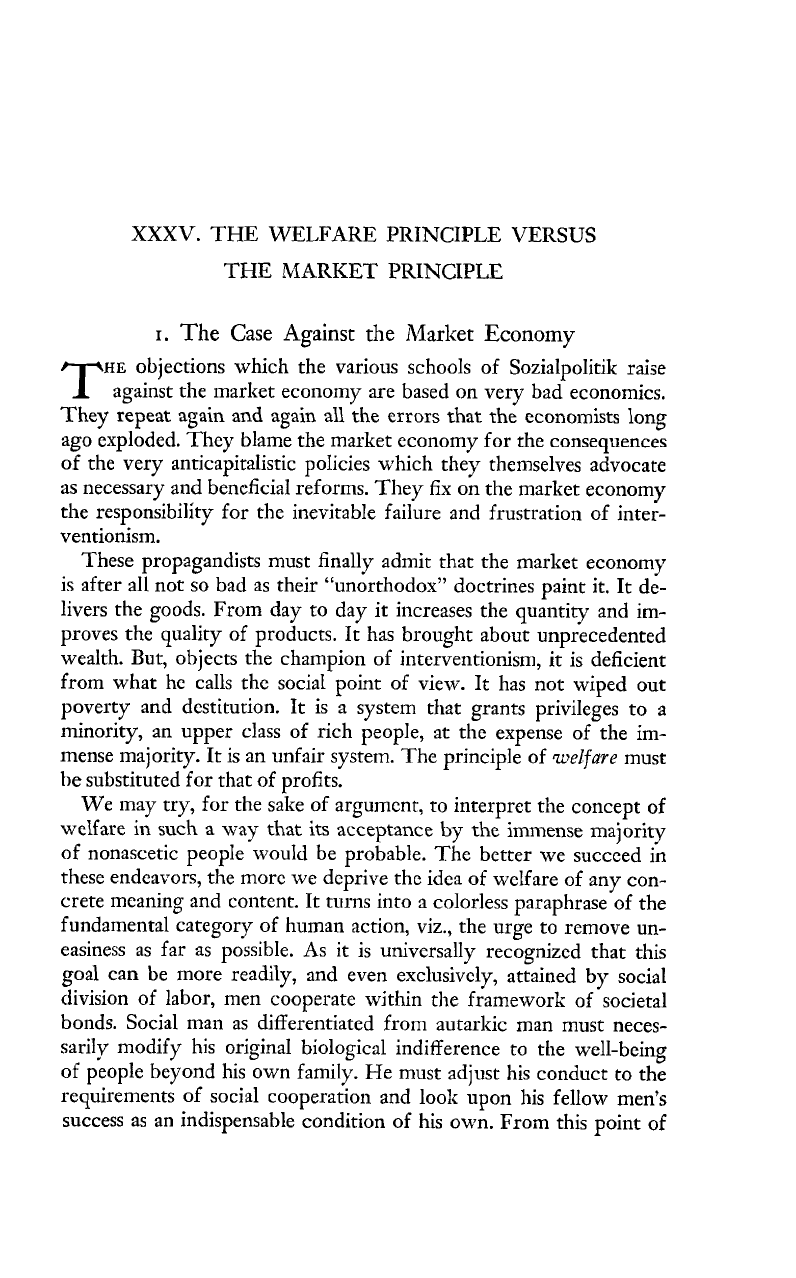
XXXV.
THE
WELFARE
PRINCIPLE
VERSUS
THE
MARKET
PRINCIPLE
I.
The Case Against
the
Market Economy
T
HE
objections which the various schools of Sozialpolitik raise
against the market economy are based on very bad economics.
They repeat again and again all the errors that the economists long
ago exploded. They blame the market economy for the consequences
of the very anticapitalistic poIicies which they themselves advocate
as necessary and beneficial reforms. They fix on the market economy
the responsibility for the inevitable failure and frustration of inter-
ventionism.
These propagandists must finally admit that the market economy
is after all not so bad as their "unorthodox" doctrines paint it. It de-
livers the goods. From day to day it increases the quantity and im-
proves the quality of products. It has brought about unprecedented
wealth.
But,
objects the champion of interventionism, it is deficient
from what he calls the socia1 point of view. It has not wiped out
poverty and destitution. It is a system that grants privileges to a
minority, an upper class of rich people, at the expense of the im-
mense majority. It is an unfair systetn. The principle of
welfare
must
be
substituted for that of profits.
We may try, for the sake of argument, to interpret the concept
of
welfare
in
such a way that its acceptance
by
the immense majority
of nonascetic people would be probable. The better we succeed in
these endeavors, the more we dcprive the idea of welfare of any con-
crete meaning and content. It turns into a colorless paraphrase of the
fundamental category of human action, viz., the urge to rcmove un-
easiness as far as possible. As it is universally recognized that this
goal can be more readily, and even exclusively, attained by social
division of labor, men cooperate within the framework of societal
bonds. Social man as differentiated from autarkic man must neces-
sarily modify his original biological indifference to the well-being
of people beyond his own family. He must adjust his conduct to the
requirements of social cooperation and look upon his fellow men's
success as an indispensable condition of his own. From this point
of
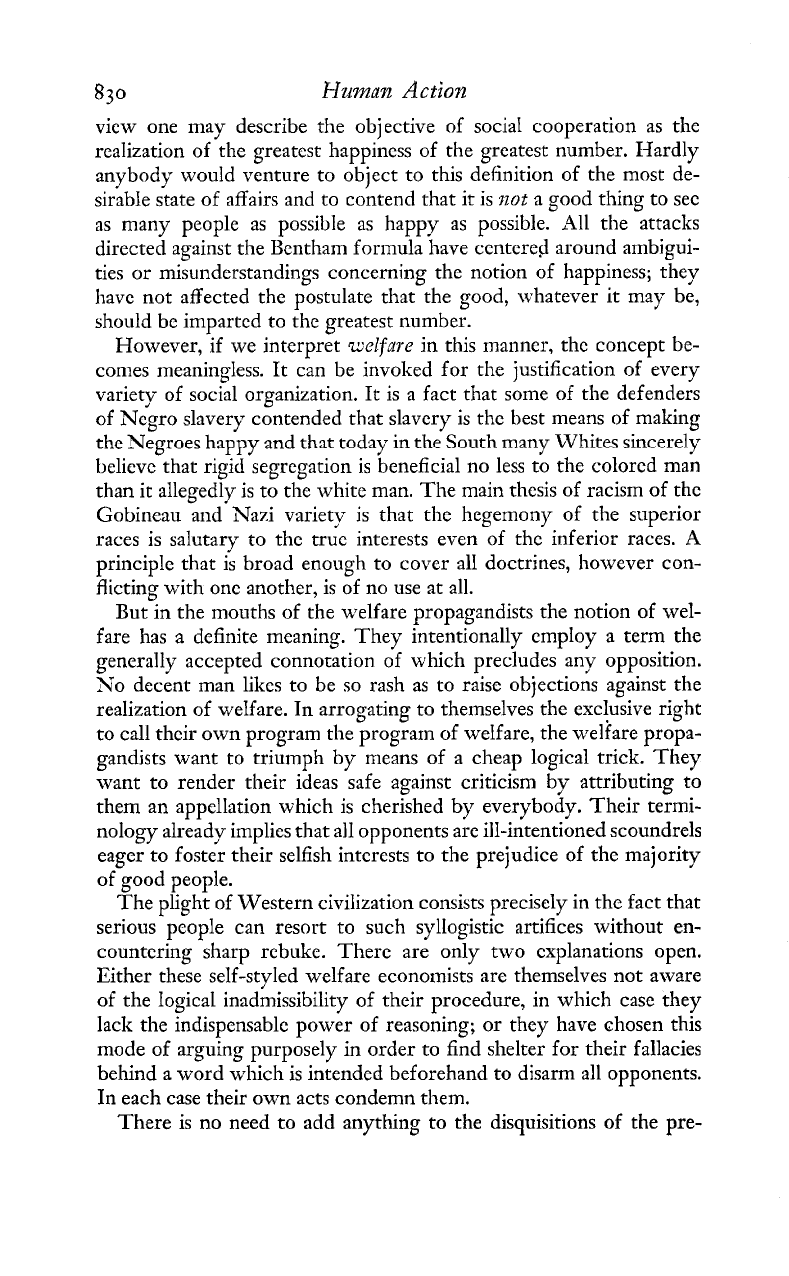
830
Human
Action
view one may describe the objective of socia1 cooperation as the
realization of the greatest happiness of the greatest number. Hardly
anybody would venture to object to this definition of the most de-
sirable state of affairs and to contend that it is
not
a good thing to see
as many people as possil~le as happy as possible. All the attacks
directed against the Bentham formula have centered around ambigui-
ties or misunderstandings concerning the notion of happiness; they
have not affected the postulate that the good, whatever it may be,
should be imparted to the greatest number.
However, if we interpret
welfare
in this manner, the concept be-
comes meaningless. It can be invoked for the justification of every
variety of social organization. It is a fact that some of the defenders
of Ncgro slavery contended that slavery is the best means of making
the Negroes happy and that today in the South many Whites sincerely
believe that rigid segregation is beneficial no less to the colored man
than it allegedly is to the white man. The main thesis of racism of the
Gobineau and Nazi variety is that the hegemony of the superior
races is salutary to the true interests even of the inferior races.
A
principle that is broad enough to cover all doctrines, however con-
flicting with one another, is of no use at all.
But in the mouths of the welfare propagandists the notion of wel-
fare has a definite meaning. They intentionally employ a term the
generally accepted connotation of which precludes any opposition.
No decent man likes to be so rash as to raise objections against the
realization of weIfare. In arrogating to themselves the exclusive right
to call their own program the program of welfare, the welfare propa-
gandists want to triumph by means of a cheap logical trick. They
want to render their ideas safe against criticism by attributing to
them an appellation which is cherished by everybody. Their termi-
nology already implies that all opponents are ill-intentioned scoundrels
eager to foster their selfish interests to the prejudice of the majority
of good people.
The plight of Western civilization consists precisely in the fact that
serious people can resort to such syllogistic artifices without en-
countering sharp rebuke. There are only two
explanations
open.
Either these self-styled welfare economists are themselves not aware
of the logical inadmissibility of their procedure, in which case they
lack the indispensable power of reasoning; or they have chosen this
mode of arguing purposely in order to find shelter for their fallacies
behind a word which is intendcd beforehand to disarm all opponents.
In each case their own acts condemn them.
There is no need to add anything to the disquisitions of the pre-
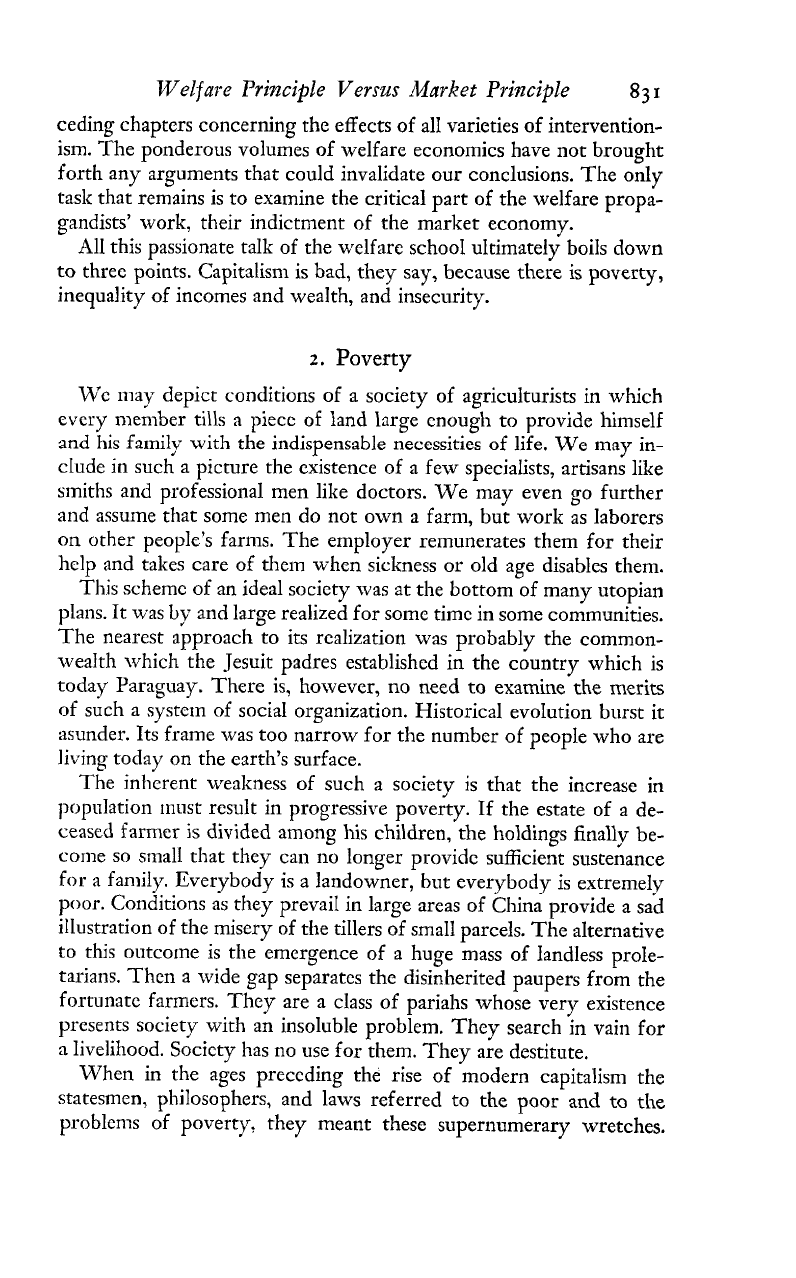
Welfare Principle
Versus
Market
Principle
831
ceding chapters concerning the effects of a11 varieties of intervention-
ism. The ponderous volumes of welfare economics have not brought
forth any arguments that could invalidate our conclusions. The only
task that remains is to examine the critical part of the welfare propa-
gandists' work, their indictment of the market economy.
All this passionate talk of the welfare schooI ultimately boils down
to three points. Capitalism is bad, they say, because there is poverty,
inequality of incomes and wealth, and insecurity.
2.
Poverty
Wc
may depict conditions of a society of agriculturists in which
cvcry
member tills a piece of land luge enough to provide himself
and his family
with
the indispensable necessities of life. We may in-
clude
in
such a picture the existence of a few specialists, artisans like
smiths and professional men like doctors. We may even go further
and assume that some men do not own a farm, but work as laborers
on other people's farms. The employer remunerates them for their
hclp and takes care of them when sickness or old age disables them.
This schemc of an ideal society was at the bottom of many utopian
plans. It was
by
and large realized for some timc in some communities.
The nearest approach to its realization was probably the common-
weaIth which the Jesuit padres established in the country which is
today Paraguay. There is, however, no need to examine
the
merits
of s&h
a
system of social organization. Historical evohtion burst it
asunder. Its frame was too narrow for the number of people who are
living today on the carth's surface.
The inhcrent weakness of such a society is that the increase in
population must result in progressive poverty. If the estate of a de-
ceased farmer is divided among his children, the holdings finally be-
come so small that they can no longer provide sufficient sustenance
for a family. Everybody is a landowner, but everybody is extremely
poor. Conditions as they prevaiI in large areas of China provide a sad
illustration of the misery of the tillers of small parcels. The alternative
to this outcome is the emergence of a huge mass of landless prole-
tarians. Then a wide gap separatcs the disinherited paupers from the
fortunate farmers. They are a class of pariahs whose very existence
presents society with an insoluble problem. They search in vain for
a
livelihood. Socicty has no use for them. They are destitute.
When in the ages preceding the rise of modern capitalism the
statesmen, philosophers, and laws referred to the poor and to the
problems of poverty. they meant these supernumerary wretches.
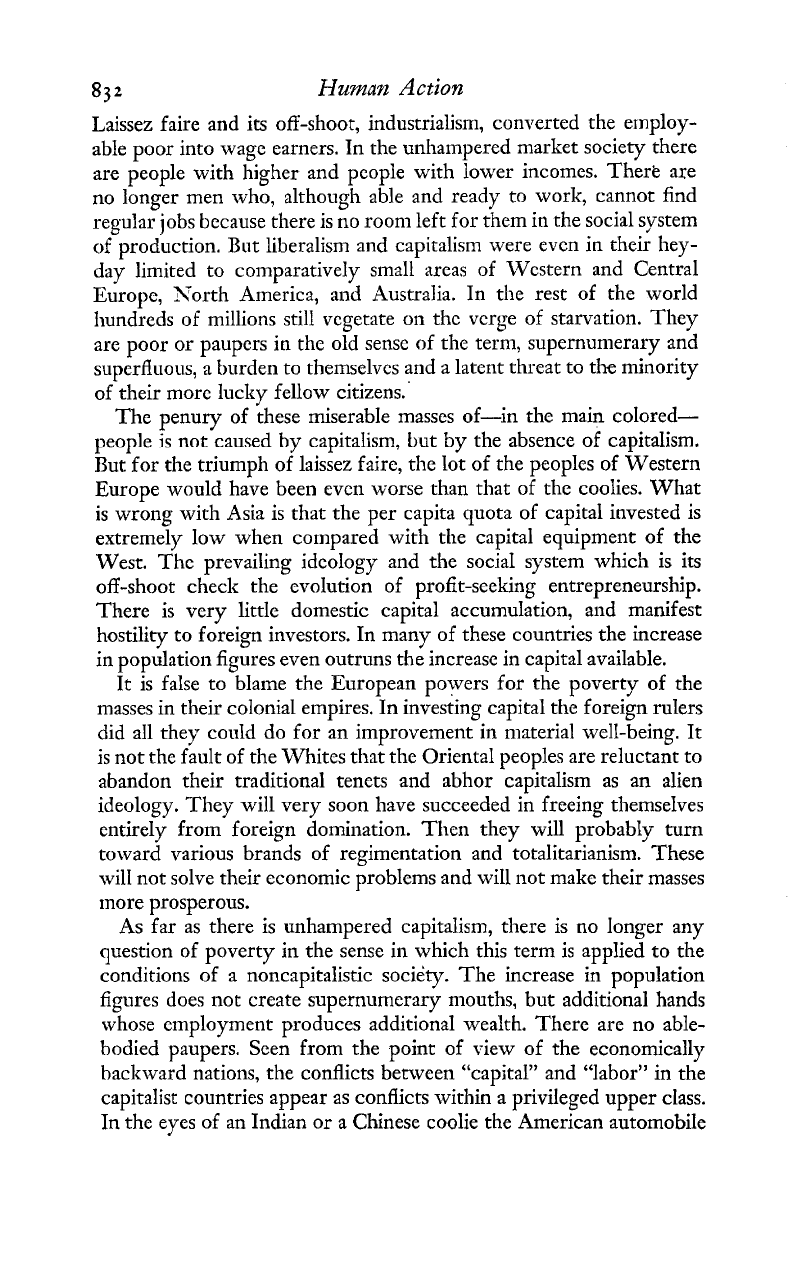
832
Human
Action
Laissez faire and its off-shoot, industrialism, converted the ernploy-
able poor into wage earners. In the unhampered market society there
are people with higher and people with lower incomes. Therk are
no longer men who, although able and ready to work, cannot find
regular jobs because there is no room left for them in the social system
of production. But liberalism and capitalism were evcn in their hey-
day limited to comparatively small areas of Western and Central
Europe, Sorth America, and Australia. In the rest of the world
hundreds of millions still vegetate on the verge of starvation. They
are poor or paupers in the old sense of the term, supernumerary and
superfluous, a burden to themselves and
a
latent threat to the minority
of their more lucky fellow citizens.
The penury of these miserable masses of-in the main colored-
people is not caused by capitalism, but by the absence of capitalism.
But for the triumph of laissez faire, the lot of the peoples of Western
Europe would have been evcn worse than that of the coolies. What
is wrong with Asia is that the per capita quota of capital invested is
extremely low when compared with the capital equipment of the
West. The prevailing ideology and the socia1 system which is its
off-shoot check the evolution of profit-seeking entrepreneurship.
There is very little domestic capital accumulation, and manifest
hostility to foreign investors. In many of these countries the increase
in population figures even outruns the increase in capital available.
It is false to blame the European powers for the poverty of the
masses in their colonial empires. In investing capital the foreign rulers
did all they could do for an improvement
in
material well-being. It
is not the fault of the Whites that the Oriental peoples are reluctant to
abandon their traditional tenets and abhor capitalism as an alien
ideology. They will very soon have succeeded in freeing themselves
entirely from foreign domination. Then they will probably turn
toward various brands of regimentation and totalitarianism. These
will not solve their economic problems and will not make their masses
more prosperous.
As far as there is unhampered capitalism, there is no longer any
question of poverty in the sense in which this term is applied to the
conditions of a noncapitalistic society. The increase in population
figures does not create supernumerary mouths, but additional hands
whose employment produces additional wealth. There are no able-
bodied paupers. Seen from the point of view of the economically
bacltward nations, the conflicts between "capital" and "labor" in the
capitalist countries appear as conflicts within a privileged upper class.
In the eyes of an Indian or a Chinese coolie the American automobile
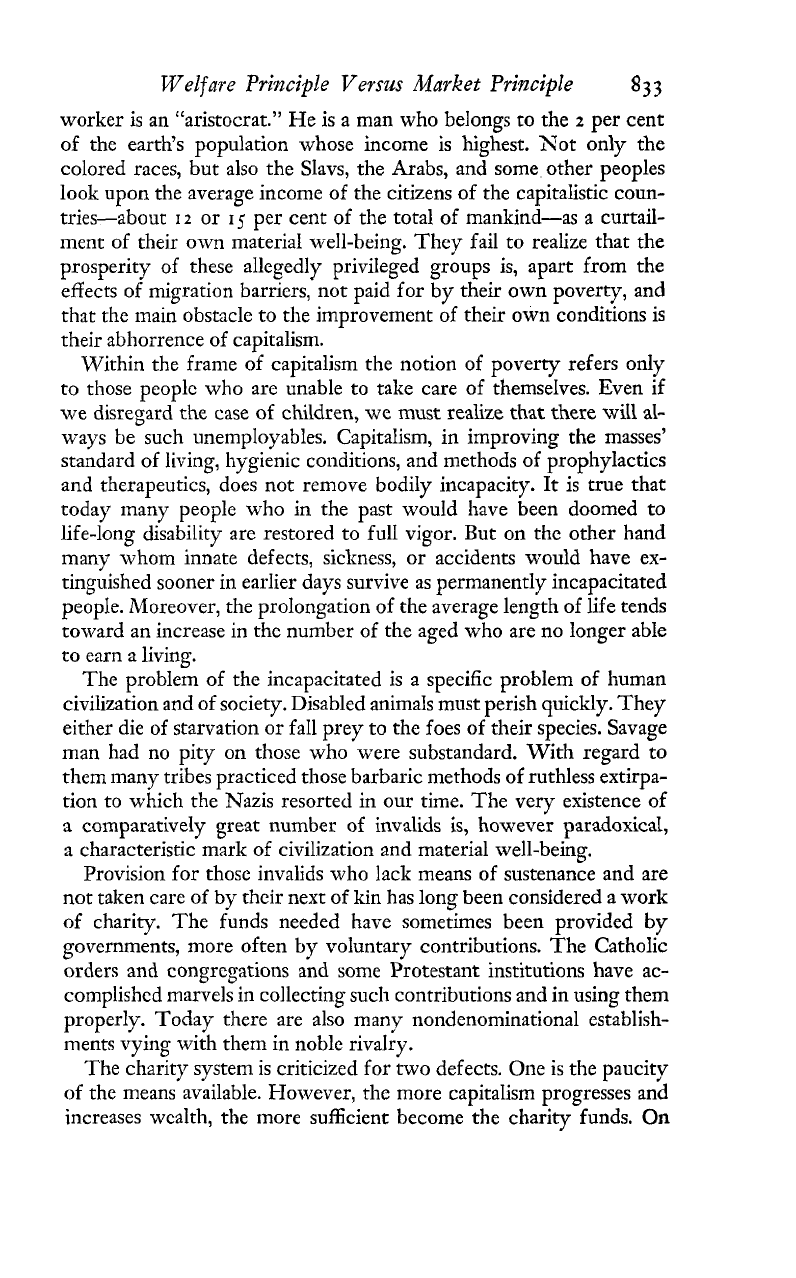
Welfare
Principle
Versus
Market Principle
833
worker is an "aristocrat." He is a man who belongs to the
2
per cent
of the earth's population whose income is highest. Not only the
colored races, but also the Slavs, the Arabs, and some other peoples
look upon the average income of the citizens of the capitalistic coun-
tries-about
r
z
or
I
5
per cent of the total of mankind-as a curtail-
ment of their own material w-ell-being. They fail to realize that the
prosperity of these allegedly privileged groups is, apart from the
effects of migration barriers, not paid for by their own poverty, and
that the main obstacle to the improvement of their own conditions is
their abhorrence of capitalism.
Within the frame of capitalism the notion of poverty refers only
to those people who arc unable to take care of themselves. Even if
we disregard the case of children,
we
must
realize
that there
will al-
ways be such unemployables. Capitalism, in improving the masses'
standard of living, hygienic conditions, and methods of prophylactics
and therapeutics, does not remove bodily incapacity. It is true that
today many people who in the past would have been doomed to
life-long disability are restored to fulI vigor. But on the other hand
many whom innate defects, sickness, or accidents would have ex-
tinguished sooner in earlier days survive as permanently incapacitated
people. Moreover, the prolongation of the average length of life tends
toward an increase in the number of the aged who are no longer able
to earn a living.
The problem of the incapacitated is a specific problem of human
civilization and of society. Disabled animals must perish quickly. They
either die of starvation or fa11 prey to the foes of their species. Savage
man had no pity on those who were substandard. With regard to
them many tribes practiced those barbaric methods of ruthless extirpa-
tion to which the Nazis resorted in our time. The very existence of
a comparatively great number of invalids
is,
however paradoxical,
a
characteristic mark of civilization and material well-being.
Provision for those invalids who lack means of sustenance and are
not taken care of by thcir next of kin has long been considered a work
of
charity. The funds needed have sometimes been provided
by
governments, more often by voluntary contributions. The Catholic
orders and congregations and some Protestant institutions have ac-
complished marvels in collecting such contributions and in using them
properly. Today there are also many nondenominational establish-
ments vying with them in noble rivalry.
The charity system is criticized for two defects. One is the paucity
of the means available. However, the more capitaIism progresses and
increases wealth, the more sufficient become the charity funds.
On
